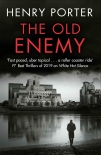The Old Enemy, Henry Porter [important of reading books txt] 📗

- Author: Henry Porter
Book online «The Old Enemy, Henry Porter [important of reading books txt] 📗». Author Henry Porter
He felt the vibration in his pocket but didn’t answer. The clouds had spilled a pool of light and he had caught it because he was waiting and the few brushstrokes applied automatically were so certain. To respond to nature in real time, almost as quickly as film, was what he was still alive for and, when he got it absolutely right, it was thrilling. The second call came and he put the palette and brushes down on the collapsible table – another piece of equipment that gave him huge satisfaction – and fished out his phone, smearing the screen with the paint on his fingers. He could hear her moving and called out her name – maybe she had dialled him by mistake. But she spoke, breathless. He couldn’t hear her because of the noise of boots in the dead grass. He waited and implored her to stand still – Goddammit! – and speak to him. He heard the crunch of the hard-core track beneath her boots then she said something. ‘What?’ he bellowed. ‘I can’t hear you.’
‘Someone’s out there with you. I don’t like the look of him, Bobby. Where are you?’
‘Just beyond the wreck.’ He pushed up his blue tam-o’-shanter, looked around and saw nothing, except the light-fall from the clouds, which now had the faintest yellow tinge and made the spray glow. He caught his breath. It was too late to change his painting and, anyway, that was then; this was now. He grappled with the phone to take a photograph, hoping that he wouldn’t lose Ulrike. He took several because the scene was developing every second. Then he returned the phone to his ear: she had gone, so he called her back. ‘I can’t see anyone.’ But at that moment he spotted a man moving by the rocks at the water’s edge, right in line with an illuminated patch of sea. ‘Ah, I’ve got him!’ he exclaimed. The figure hesitated then moved off to the right to take the track to the lighthouse that ran across the peninsula between him and Ulrike. ‘He’s going the other way,’ he said, letting himself down into the camp chair. ‘Let’s have a brew-up! Come and join me. I want you to see what I’ve been doing. I think it’s rather good . . . well, it’s not bad.’ He was never sure what he felt about his work. Elation was often followed by a crash in spirits. She hung up and he reckoned he’d got about ten minutes to get the water boiling and smoke a cigarette. He leaned forward and yanked a camping stove from his bag, lit it and placed a small whistling kettle on the flame. There was just one enamel mug for them, but he had tea, milk and a silver-and-glass hip flask that he had inherited from his father, together with the taste for a dash of whisky in his tea. They often shared a mug beneath the Baltic sky, Ulrike making a rather too penetrating appraisal of his latest. She could go easy on him, he reflected, but that wasn’t her. He sat back and ran an eye over his work, an unlit cigarette in his hand. Some sketchiness in the foreground, where the paint was thin, worried him, but he decided he liked the effect, and he was glad he hadn’t done any more to the light on the sea. She’d stopped him overworking the scene.
The roar of the camp stove obliterated all other sound, so he would not hear her call out, which she always did with a wave when she reached the brow. He looked to his right and lit the cigarette discreetly, inhaled and let the smoke dribble from the corner of his mouth. It was stupid to pretend he didn’t smoke. What bloody harm could it do now? But it made her very angry indeed, because she quit her tiny ration of smokes when he received the diagnosis. He took another drag and leaned forward to remove the kettle, which was beginning to tremble on top of the stove. As he did so, something very powerful hit the aluminium frame of his chair and threw him on to the grass to his right. He rolled on to his front. A man was moving towards him, marching robotically, with the scope of a rifle pressed to his eye. A second shot hit the table and Harland thought, fucking amateur. But he had nothing to defend himself with, and nowhere to go and, besides, he wasn’t up to running, not over this ground, not with his lungs, not with his aching bones. All he hoped was that Ulrike wouldn’t witness this. He rolled again to search for his phone. He needed desperately to speak to her, to say he loved her, because this was it: they’d found him and, however incompetent the assassin, he would certainly take what little life remained to him.
The third shot tore across the back of his left calf. He writhed in the grass, as much from anger as pain, and at the same time realised the prescribed morphine was suppressing the effect. He’d started the course, without telling Ulrike, three days before when a deep internal pain made it hard to concentrate. He reached for his sketchbook, the pages of which were fluttering in the breeze, and, half noticing that the burner was on its side and scorching the grass very close to the turpentine container, he scrawled ‘Berlin





Comments (0)